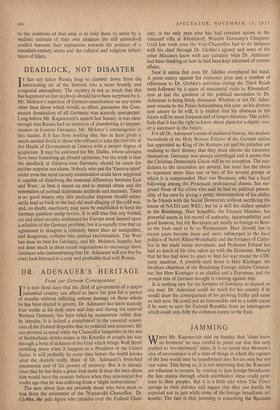DEADLOCK, NOT DISASTER
IT has not taken Russia long to clamber down from the intoxicating air of the Summit into a more homely and congenial atmosphere. The mystery is not so much that this has happened as that anybody should have been surprised by it. Mr. Molotov's rejection of German reunification on any terms other than those which would, in effect, guarantee the Com- munist domination of all Germany was scarcely unexpected. Long before Mr. Kaganovich's speech last Sunday it was clear enough that Russia had no intention of abandoning its puppet- masters in Eastern Germany. Mr. Molotov's intransigence in this matter, if it has done nothing else, has at least given a much-needed shock to those who refused to take the rhetoric of the Heads of Government at Geneva with a proper degree of scepticism. It may be awkward for Mr. Dulles, whose advisers have been fomenting an absurd optimism, but the truth is that the deadlock at Geneva' over Germany should be cause for neither surprise nor alarm. Nobody who put the 'Geneva spirit' under even the most cursory examination could have supposed it capable of dissolving the essential differences between East and West: at best it meant an end to mutual abuse and the restoration of normal diplomatic methods and manners. There IS no good reason why this particular impasse should neces- sarily lead us back to the bad old mud-slinging of the cold war, and, no doubt, machinery may soon be established to keep the German question under review. It is still true that any formal, cut and dried security settlement for Europe must depend upon a solution of the German problem; but it is equally true that an agreement to disagree is infinitely better than an undignified, and dangerous, collapse into mutual recrimination. The West has done its best for Germany, and Mr. Molotov, happily, has not done much in these recent negotiations to encourage those Germans who (remembering that Dr. Adenauer will not live for ever) look forward to a cosy and profitable deal with Russia.


































 Previous page
Previous page